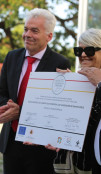Launching Of Disaster and Risk Management Strategy for the Agriculture Sector in Timor-Leste, funded by the EU

On 15th of February 2022, the Government of Timor-Leste, the Minister of Agriculture and Fisheries launch the Disaster and Risk Management (DRM) Strategy for the Agriculture Sector at the Ministry of Finance’s auditorium.
The Disaster and Risk Management Strategy for the Agriculture Sector was developed by the MAF DRM Taskforce of Ministry of Agriculture with technical support from FAO-Pro Resilience Project team and funded by the European Union, with a total programmes budget of about EUR 3M or USD 3.3M .
Among the high-level dignitaries presence in the event, there are the Minister of Finance, Mr. Rui Agusto Gomes, Minister of State Administration, Miguel Pereira de Carvalho, State Secretary for Civil Protection, Joaquim Gusmao dos Reis Martins, EU Head of Cooperation, Ramón Reigada, UN Resident Coordinator, Roy Trivedi and Assistant FAO Representative, Paula Lopes da Cruz..
Both Minister of Agriculture and the Head of Cooperation say in their remarks that the Agriculture Sector Disaster Risk Management Strategy is an important document. This strategy is a starting point for investment Risk and Disaster Reduction in the agriculture sector. Owing to the fact that disaster events and its impacts for the agriculture increase yearly. Timor-Leste has faced negative impacts of droughts or El Nino iha 2015-2016, this affects 78% households in Timor-Leste. Thousands of Timorese agricultures have lost their productions and live stocks, maize productions decrease to 40% and corn to 57%. Almost 50% households related that lost live stocks and 21% households (around 29,050 houses) related that sick live stocks.
The EU Head of Cooperation added "the EU recognises the opportunity that now exists to ensure that disaster risk reduction and climate change adaptation plans are merger to avoid dpuplication of effort and maximise the use of resources to reduce economic impact and loss of life."
The Secretary of State for Civil Protection appreciates MAF for taking the initiative to develop the DRM srategyfor the Agriculture Sector, which can be a reference to other relevant Ministries and agencies to prepare their sector specific DRM strategy. The initiative is very important for MAF to identify gaps in information and knowledge management, as well as mobilizing funds for DRM interventions in the sector. As a member of the VIII Government who is responsible for the coordination and implementation of DRM, all necessary supports will be provided in terms of coordination and implementation of policies, plans and DRM strategies. “I believe that after the launching of the DRM Strategy for the Agriculture Sector, MAF will develop operational plans for disaster prevention and mitigation, and emergency responses to disasters and the recovery plans in the agriculture sector”.
Ministry of State Administration say “In the implementation of DRM activities, MAE faces challenges, but through its direct and indirect management bodies, MAE was able to successfully implement the responses program to disasters at national and local levels, bringing public services closer to families, through the existing mechanisms of administrative decentralization programs and bring closer to the future of administrative decentralization.”
Paula Lopes as the Representative of FAO, was pleased with the progress and efforts of the ministry in getting this important piece of work done. She appreciates the collaboration from MAF, SSCP, MAE and MoF and the generous financial support from the EU, which has enabled FAO to provide the needed technical assistance to MAF to establish and make functional the MAF DRM Taskforce and develop the DRM Strategy for the Agriculture Sector. FAO will continue to provide technical supports to the sector to improve more in the future in order to contribute to building resilience for the community; this effort can be achieved because of the financial support from European Union.




